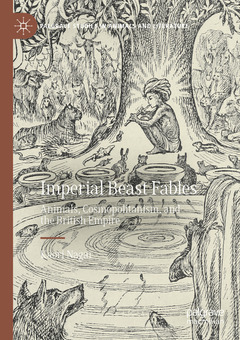Description
Imperial Beast Fables, 1st ed. 2020
Animals, Cosmopolitanism, and the British Empire
Palgrave Studies in Animals and Literature Series
Author: Nagai Kaori
Language: EnglishPublication date: 07-2021
252 p. · 14.8x21 cm · Paperback
Publication date: 07-2020
252 p. · 14.8x21 cm · Hardback
Description
/li>Contents
/li>Biography
/li>Comment
/li>
This book coins the term ?imperial beast fable? to explore modern forms of human-animal relationships and their origins in the British Empire. Taking as a starting point the long nineteenth-century fascination with non-European beast fables, it examines literary reworkings of these fables, such as Rudyard Kipling?s Jungle Books, in relation to the global politics of race, language, and species. The imperial beast fable figures variably as a key site where the nature and origins of mankind are hotly debated; an emerging space of conservation in which humans enclose animals to manage and control them; a cage in which an animal narrator talks to change its human jailors; and a vision of animal cosmopolitanism, in which a close kinship between humans and other animals is dreamt of. Written at the intersection of animal studies and postcolonial studies, this book proposes that the beast fable embodies the ideologies and values of the British Empire, while also covertly critiquingthem. It therefore finds in the beast fable the possibility that the multitudinous animals it gives voice to might challenge the imperial networks which threaten their existence, both in the nineteenth century and today.
Introduction: Rats in the Box.- Chapter 1: Winged Tales: The Advent of the Imperial Beast Fable.- Chapter 2: ‘Once Upon a Time When Animals Spoke’: Theories of the Beast Fable.- Chapter 3: Into the Chinese Boxes: The Jungle Books.- Chapter 4: Kangaroo Notebook: Abe’s Metatherian Journey.- Chapter 5: Animal Alphabets: Chesterton’s Dog, Browning’s Rats, Lear’s Blue Baboon.- Chapter 6: Fabling Cosmopolitanism: The Ark Esperanto.
Kaori Nagai is Lecturer in Victorian Literature at the University of Kent, UK. She is the author of Empire of Analogies: Kipling, India and Ireland (2006). She has edited Rudyard Kipling’s Plain Tales from the Hills and The Jungle Books for Penguin Classics, and is the co-editor of Kipling and Beyond (2010), and Cosmopolitan Animals (2015).





